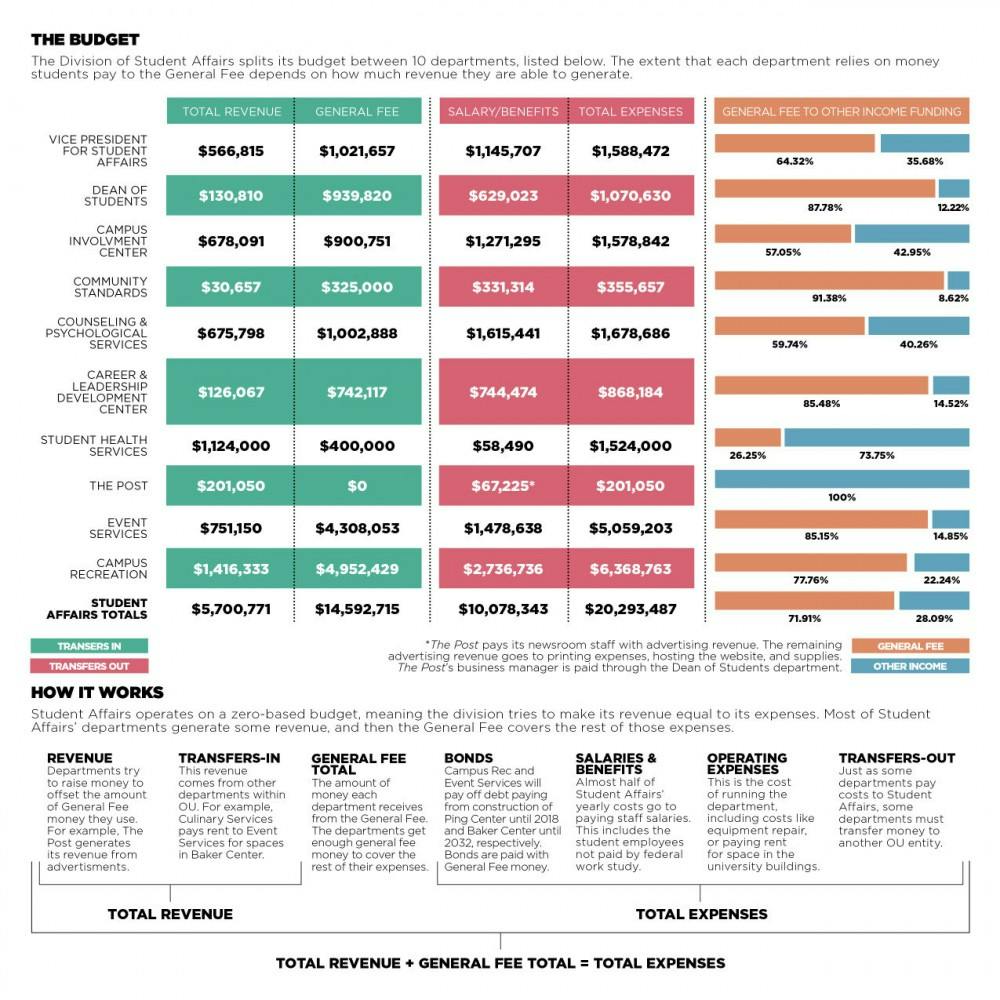Student Affairs operates on a $20.3 million budget, and half of those funds go to paying for staff members.
Editor’s Note: This story is the first in a recurring series that will break down departments’ budgets that receive money from the $27.4 million General Fee, which students pay alongside tuition.
Ideally, Ohio University’s Division of Student Affairs would like to add two new employees next year: one to investigate Title IX sexual misconduct violations and the other to lead a campaign against high-risk behavior.
To add any new staff members, the division has to find the money to pay them.
The division, which has a $20.3 million budget, is supported by the General Fee, a $1,256 charge that full-time undergraduates on the Athens campus paid this year. About 72 percent of those expenses are paid for with student payments to the General Fee.
To pay for new staff members, Vice President for Student Affairs Ryan Lombardi said the division must either ask for additional General Fee money or look where it can move staff or cut underused programs.
“We have a really clear conscience of knowing that any expense we have is coming straight from the students, and we don’t want to be a part of the problem of the increasing costs of higher education,” Lombardi said.
Since the total General Fee pool of funding rises with enrollment, Student Affairs will have some years in which the division can receive extra General Fee funding, so it can hire new staff members without having to restructure some of its departments, Lombardi said.
{{tncms-asset app="editorial" id="b37af4f4-ac1e-11e4-bcbc-839522755dbb"}}
One organization within Student Affairs, the Career and Leadership Development Center, added three new staff members with $60,000 from the General Fee. However, it split the costs of these members’ salaries with three academic colleges since the staff members will serve specific majors in those colleges.
During the past three academic years, the division’s consistently seen nearly half its budget spent on employees, but sometimes expenses will move between the departments, said Megan Vogel, special assistant to the vice president for Student Affairs.
For example, Student Affairs moved the Student Activities Commission funds from the Campus Involvement Center to the Dean of Students’ discretion when the position began advising the distribution of SAC funds.
SAC received $405,409 this year, Lombardi said.
The commission gave three organizations $100,000 each this year. Those organizations include the University Programming Council, International Student Union and the Black Student Cultural Programming Board. What’s leftover, about $100,000, is distributed to student organizations that apply for SAC funding on a rolling basis, said Dean of Students Jenny Hall-Jones.
And that money is in demand.
“We regularly get requests for more money than we’re able to fund, based on the budget that we currently have,” Hall-Jones said.
Student Affairs pays the $65,817 salary of the business manager at The Post, an editorially independent publication.
“The Post’s business manager is paid using OU funds, but that by no means affects the editorial independence of The Post,” said Jim Ryan, Post editor-in-chief.
{{tncms-asset app="editorial" id="2e4d0430-abeb-11e4-957a-f748b0f2c2f8"}}
The General Fee covers most of the division’s expenses, but most of the departments have some way of generating revenue to help support costs.
Student Health Services collected $1.12 million from the optional Student Health Insurance premium, which cost students $1,635 this year, unless waived, and funds Student Health Services and Counseling and Psychological Services.
Not all of the General Fee money is used to pay employees and fund programs; some of it is used to pay OU’s debts and upkeep.
The Division of Student Affairs pays about $5 million every year to pay off bonds that funded the construction of Baker University Center and Ping Recreation Center.
Student Affairs received $270,000 from the General Fee this year to pay for furniture and system replacements, which paid for new chairs in Front Room and West 82, and will cover replacement lighting, sound equipment and 24 new lamps, as well as other items.
Event Services plans to spend nearly $240,000 this year on replacement equipment and set aside the rest for things that need replaced sooner than expected, said Dustin Kilgour, executive director of Event Services.
Kilgour said the department “runs a pretty lean shop.” Event Services makes some money by charging people from outside OU for room rentals, but most room rentals are free for students, Kilgour said.
In total, the department brought in $751,150 in revenue this year.
Event Services is also trying to hire three new staff members, but they plan to pull those salaries from their operating expenses budget, since the new staffers would be intended to eliminate event work they have contracted from outside companies, Kilgour said.
“We’re not trying to run a major profit. That’s not why we’re here,” Kilgour said. “We’re here to support our students and make sure that their events are supported in a way they want them supported.”
@DanielleRose84
dk123111@ohio.edu






